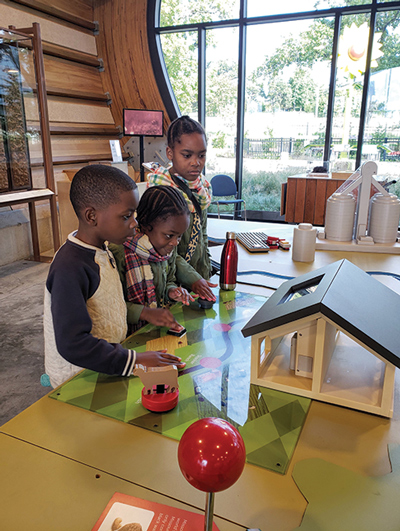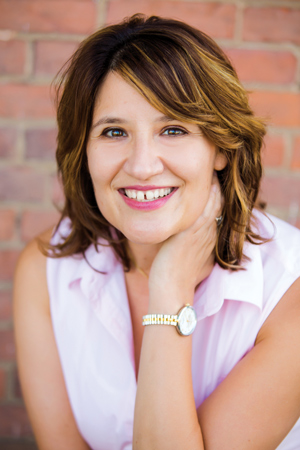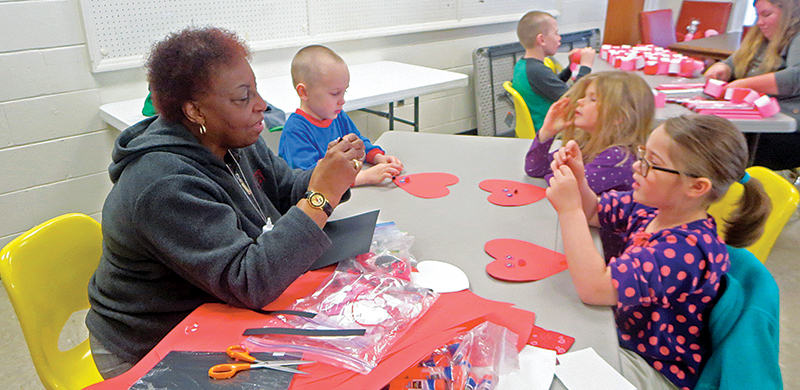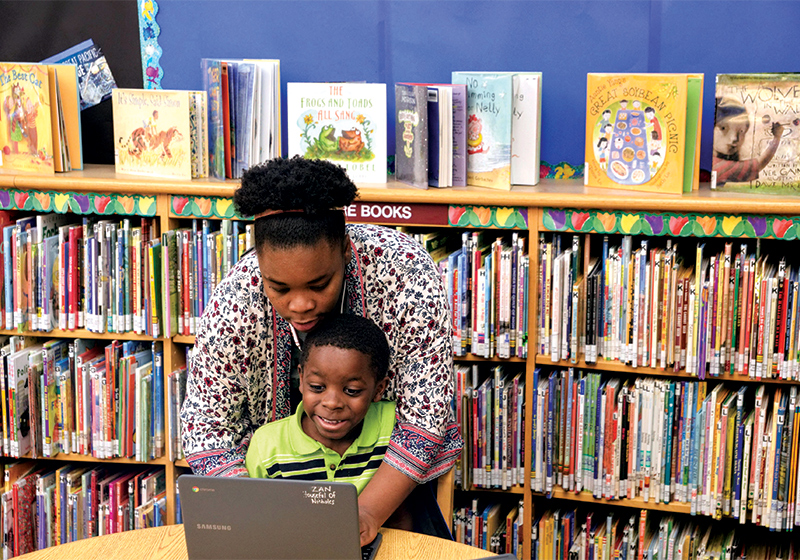Homeschooling Families Tap into Library Services, from Storytime to Science Equipment
As more children and teens are taught at home, libraries are stepping up to serve them.
|
|
Homeschooling parent Natasha Nicholes with her youngest son at the West Pullman Branch of the Chicago Public Library.Photo courtesy of “Houseful of Nicholes” |
On any weekday afternoon at the Henrietta Public Library (HPL), just outside of Rochester, NY, children can be found working on lessons in the conference rooms, borrowing a microscope, or learning how the library works. They are part of the small but growing number of homeschool kids across the nation for whom libraries are key resources.
“People have a lot of misconceptions about homeschooling,” says Adrienne Pettinelli, director of HPL and author of Helping Homeschoolers in the Library (ALA Editions, 2009). “Homeschoolers are all doing the same thing. They’re all conservative Protestants. They’re all wacky, crunchy people. None of these things are true. There’s lots of different types of people who homeschool for lots of different types of reasons.”
Across the country, librarians like Pettinelli are stepping up to serve families who choose to educate their children themselves. Pettinelli first became interested in homeschooling 20 years ago when she was working toward her master’s degree in library science. The family that lived downstairs from her apartment taught their child at home. As she got to know her neighbors, Pettinelli realized they were “clearly having a really great family experience.”
Homeschooling has been legal in all 50 states since 1993, and the numbers have been steadily increasing over the past two decades. According to federal data, just more than three percent of U.S. children are educated by their parents. Homeschooling is more popular in rural areas, with the largest percentages in the southern and western states. The Homeschool Legal Defense Association has an interactive map showing states with varying degrees of regulations. Some states—particularly in the Northeast—require evaluations of parent qualifications or student progress. Others have minimal oversight, such as requiring parents to notify the state of their intent to homeschool, and a few—mostly in the Midwest and West—have no regulations at all.
Read: A Home Away from Home: Librarians and Homeschoolers
 |
The Nicholes children at the St. Louis (MO) Science Center.Photos courtesy of Houseful of Nicholes |
Libraries are central
“Public libraries are known to be very important for homeschooling families,” says Ramiro Salazar, library director for the San Antonio Public Library (SAPL) and president of the Public Library Association. “We understand the importance of homeschooling. We understand why parents decide to homeschool their children, and we know that we have an important role in advancing education in whatever format.” SAPL offers events for homeschool families at several branches and, like many public libraries around the country, allows homeschool parents to receive teacher cards for expanded borrowing privileges.
Some public schools—such as those that American Association of School Librarians (AASL) president Mary Keeling oversees in her job as superintendent of school libraries for Newport News Public Schools in Virginia—allow homeschoolers to come to their media centers and use resources on the premises, although they likely will not circulate materials. Keeling’s district doesn’t require the students to live within its boundaries. One Newport News high school allows homeschool students to use the media center and access online courses. (AASL has no official position on homeschooling.)
According to the National Center for Education Statistics, the most common reason for parents to educate their children at home is a concern with the school environment. More than one-third of homeschooling parents cite worries about safety, drugs, or peer pressure. Another common reason is dissatisfaction with the academic quality or a desire to provide religious teaching. Others say they homeschool because of physical or mental health reasons, or to provide a nontraditional approach.
Natasha Nicholes chose to homeschool her four children in 2012, when the Chicago Public Schools were undergoing a tumultuous reform and many schools were closing—especially those serving Black students.
“School was no longer fun for my oldest son, and being a parent became more about going to battle daily for what should have been an inherent right for my child,” says Nicholes.
After her oldest son’s campus closed, she decided to homeschool him and her three younger children. She and her husband had been taking them all to the local library since they were babies, so naturally she turned to the library to supplement their learning with storytime, STEM programs, book clubs, and crafting sessions.
She also takes advantage of the Chicago Public Library’s free passes for nearly 20 attractions, such as the Field Museum and the Museum of Science and Industry. “I’m sure I wouldn’t be able to afford going to these types of events with all four of my children if the library didn’t offer them to patrons like us,” says Nicholes, who writes about her family’s homeschooling experiences on her blog, “Houseful of Nicholes.”
Read: SLJ Review: ReThinking School: How To Take Charge of Your Child's Education
 |
Adrienne Pettinelli |
Welcoming homeschoolers
When Pettinelli graduated and began working as the children’s librarian at the Lockport Public Library in upstate New York, she made a point of being friendly to homeschoolers. “They felt really comfortable coming and asking me for help,” she says. “If a homeschooler thinks there’s a chance that you might judge them or speak harshly to them, they aren’t going to self-identify.”
Halifax County (NC) Library director Brenda Faithful also reached out to homeschoolers when she was working at the Scotland Neck branch library in rural eastern North Carolina. She noticed a dozen or so families who frequently convened at the library. With the conversion of many public schools to charter academies, homeschooling has grown in popularity in Halifax County. The library was unprepared for this change.
“We did not really have the resources that they needed,” Faithful says. With the help of one homeschooling mom, Monica Olivera, Faithful organized a meeting to learn what materials the families required. The parents wanted a section of the library devoted to homeschooling and had specific requests.
“It’s important to have two or three different curricula available for homeschoolers to try out,” says Olivera, who chose to homeschool her two children because she was unsure about the quality of charter schools. “Because when you’re first starting out, honestly, the best thing you can do is have a complete curriculum that tells you everything you need to do. It really helped me.”
Other frequently requested items included educational DVDs and science equipment, such as microscopes and slides. As the Scotland Neck collection grew, the numbers of homeschoolers at the library tripled. But there were growing pains. Faithful noticed, for instance, that few homeschoolers attended the summer reading program, even though the activities attracted more than 100 children. “They were uncomfortable, because it was set up so all the age groups came at the same time,” she says. “They weren’t used to being in groups of children.”
To accommodate, the library changed its summer reading format. Programs were broken up into five age groups—preschool, kindergarten to second grade, third to fifth grade, tween, and teen. “They came and they had a great time and they started participating,” says Faithful. Going forward, the library kept the age-group format for its summer reading events. It also changed outreach methods: Instead of relying on flyers distributed through public schools, staff also posts announcements through online homeschool groups and social media. In rural areas, home internet service is often expensive and slow, and libraries are an important source of free, fast Wi-Fi for online lessons.
Libraries are integral to homeschool routines in other ways. Many co-ops, families that gather and work together, meet in public library conference rooms. Some libraries, such as San Antonio Public Library offer programs specifically for homeschool students. Others, such as the Madison Public Library in Ohio, have kits with a librarian-selected collection of books and other materials relating to one subject designed to supplement textbooks and curriculum.
The Scotland Neck branch has hosted a homeschool science fair. Over time, some homeschool parents and kids became library volunteers. Teens assist at events for younger children. Olivera, who reviews homeschooling materials and bilingual Spanish books for her website, mommymaestra.com, donated used books to the library.
 |
Homeschool kids at Scotland Neck (NC) library make valentines for retirees with volunteer Pat Barnes.Photos courtesy of Scotland Neck Memorial Library (Halifax County Public Library) |
Assembling resources
Homeschooling is the first choice for some American families stationed overseas for the military or civilian employment. Such was the case for Amanda Hsiung-Blodgett, whose family has moved to Morocco, Turkmenistan, Canada, and Ecuador for her husband’s job. While living abroad, Hsiung-Blodgett and her children often accessed ebooks that weren’t available locally by checking them out using OverDrive through public libraries.
Since homeschooling parents often prepare lessons for their own children, some end up becoming a resource for libraries, as Hsiung-Blodgett did. When she returned to the States, she taught her son at home for a year to ease the transition to American middle school. Because her family is bilingual in English and Mandarin Chinese, Hsiung-Blodgett developed activities to teach Chinese culture and language, which she shares on her website (misspandachinese.com) and the Playful Chinese podcast. While spending time at the library with her son and daughter, Hsiung-Blodgett got to know the Manoa (HI) Public Library director Christel Collins and designed a four-week series of 90-minute events called the Global Education Program. Activities include games, paper cutting, and a performance by a local Lion Dance troupe. Now living in the suburbs of Washington, DC, Hsiung-Blodgett is working to bring her programs to the Falls Church (VA) Public Library.
While materials requested by homeschoolers are often rolled into general library budgets, some librarians have found funding specifically to serve this community. While at the Lockport library, Pettinelli applied for a New York State child and parent services grant. The library was awarded $80,000 to purchase curriculum kits for the four branch locations and to hire a coordinator to oversee the program.
Pettinelli’s book, written under the name Adrienne Furness, includes background about the homeschool movement, profiles of various styles of teaching, and practical tips for librarians.
Pettinelli currently teaches a four-week course for librarians serving homeschoolers through the University of Wisconsin’s online program. At the start of class, she asks her students if they or someone they know has homeschooled. “It used to be like a big fat ‘no’ all the time,” she says. “Now half the students have really direct experience with homeschoolers. Either they had been homeschooled, they homeschool their kids, or their sister homeschools their kids.”
A charter school partnership
“BookShark and Moving Beyond the Page are the two that [people] grab immediately,” says Ocean Grove resource library assistant Juliana Schouest, referring to popular reading programs. Other in-demand items include Singapore Math and Math You See curricula, as well as 40 laptops that were previously used by district staff. The collection at Ocean Grove is acquired differently than at other school libraries. Because it is a charter funded by a public school district, every student receives a $2,600 annual stipend to use for books or supplemental learning. At the end of the school year, families return their materials to the depository, where Schouest catalogs them and makes them available to other students to check out. The high school textbooks, which can cost up to $300 each, are funded by a $20,000 college readiness grant from the state of California. |
 Grace Hwang Lynch is a Bay Area writer focusing on culture, education, and food.
Grace Hwang Lynch is a Bay Area writer focusing on culture, education, and food.
RELATED
The job outlook in 2030: Librarians will be in demand
The job outlook in 2030: Librarians will be in demand
ALREADY A SUBSCRIBER? LOG IN
We are currently offering this content for free. Sign up now to activate your personal profile, where you can save articles for future viewing



 Nestled in the redwood forest between California’s Silicon Valley and the Pacific coast is
Nestled in the redwood forest between California’s Silicon Valley and the Pacific coast is 



Add Comment :-
Be the first reader to comment.
Comment Policy:
Comment should not be empty !!!